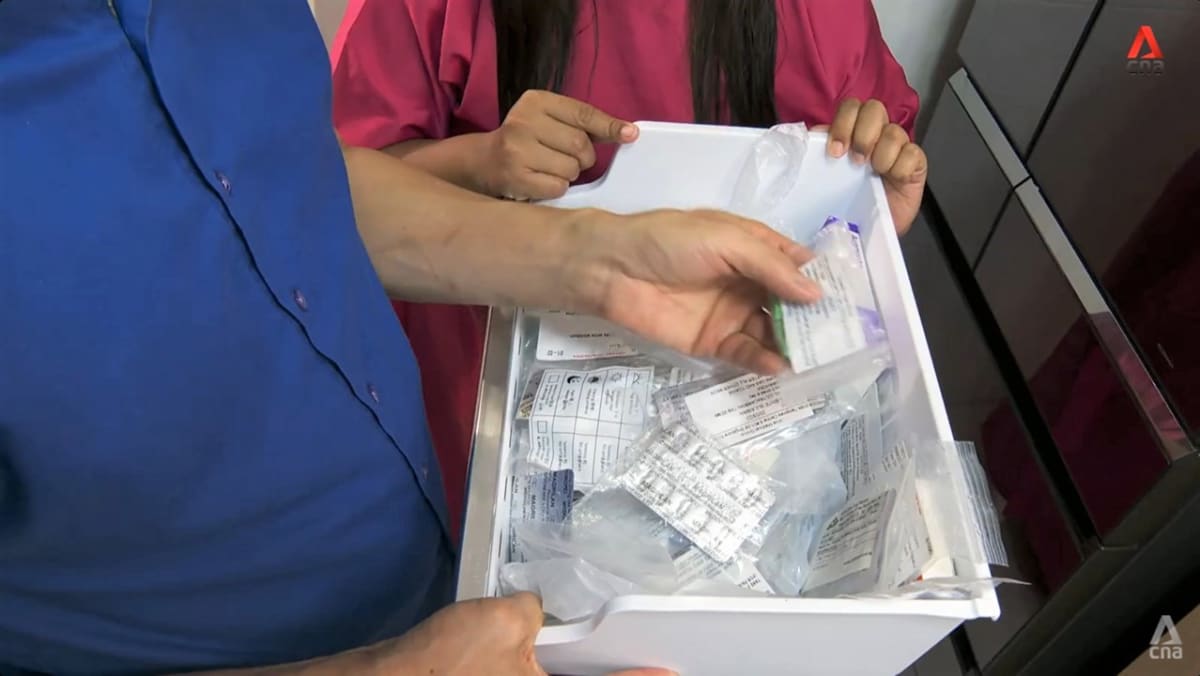SINGAPORE: Sometimes when her body aches, Humaira Sulaiman takes the painkillers she keeps in her fridge.
Some of her medications, including for flu and coughs, are past their expiry date by as much as two years. But that is not something she checks.
“Maybe I tell myself (they work),” she said. “Most of the time … (they seem) to work.”
Another Singaporean, Oskar Song, knows he has taken expired medication. Some of his medicine boxes are yellowing, and the expiry dates have faded. But he is “not really” worried about the side effects. “I’m still alive,” he quipped.
The two of them are not the only ones with no qualms about storing medicines past the expiry dates.
In a Talking Point poll on Instagram, 33 per cent of the 708 respondents said they have taken expired medication. Another 19 per cent said they did not check expiry dates when taking their medicines.
But do expired medications still work as intended? Are they even safe to consume? Here are six things you should know the next time you have a runny nose, headache or allergy symptoms.
WATCH: Is expired medicine still safe to consume? (22:02)
1. WHAT IS THE SHELF LIFE OF MEDICINES?
Different medicines have different shelf lives. For tablets and capsules, “it can be as short as six months” and “as long as five years”, according to Priscilla Lim, the managing pharmacist of The Pharmacy Inc.
For liquids, it is two years on average, and one to two years for eye drops.
Compounded medications, which are custom-made for a patient’s “unique needs”, typically have a shorter shelf life — up to six months — “because they’re made from scratch”, said Lim.
Some medications have a longer shelf life “because they’re chemically more stable”. They can withstand change arising from contact with other chemicals or the environment — more so than medicines that are chemically not stable, which “may degrade faster”, she said.
For medicines to be considered effective, manufacturers set the level of potency at above 90 per cent.
A drug’s efficacy past its expiry date may be affected, however, by storage conditions, which are an “important variable”, said Lita Chew, who heads the National Cancer Centre Singapore’s pharmacy department.
Tests done by the United States Food and Drug Administration to extend the shelf life of drug products stockpiled by the US military have shown that the stability of some drugs can be extended beyond the labelled expiry dates.
About 88 per cent of the expired drugs, representing 122 drug products, were deemed potent enough to be kept for at least a year beyond their original expiry date.
3. WILL REFRIGERATION MAKE A DIFFERENCE?
Some people store their medicines in the fridge. But the best thing to do is check the label for storage instructions. Some medications may damage because of the cold and are best stored between 15 and 25 degrees Celsius instead.
Related stories:
US FDA panel says popular decongestant used in cold medicines ineffective
Medicine from vending machines? One company hopes to roll out 50 dispensers in Singapore this year
This means avoiding places that collect heat, such as beside the oven or the fridge, and looking for a cool, dry place, like a drawer or a shelf.
In Singapore’s hot weather, however, that is not always possible, noted Singapore General Hospital principal pharmacist Ong Kheng Yong.
“We’ve done a small experiment, and the temperatures at home can range (up to) as high as 30 to 31 deg C,” he said. “Under these less-than-ideal conditions, there’s a chance that the medication may deteriorate faster than it should.
“That brings down its shelf life, and it may not last all the way till its expiry date.”
But she does not recommend, for example, using eye drops past the expiry date. If the bottle is frequently opened and closed, “the chances of contamination are very high”.
“When you have too much contamination, the preservatives won’t be able to handle it,” she warned. “You don’t want to play (about) with your eyes, right?”
The safety of other expired medicines “is also questionable”. She cited the commonly prescribed antibiotic, tetracycline. When it degrades, one by-product is anhydrotetracycline.
While this is unlikely to form before the expiry date under recommended storage conditions, “if you take expired tetracycline, the by-product … is toxic to the kidney”, she said. “It can cause kidney damage.”
When a pill appears powdery, that is also an “indication that this drug isn’t safe”, Chew added.
6. SHOULD YOU TAKE DRUGS NOT PRESCRIBED TO YOU?
To clear out their supply of medications, some people have resorted to giving away or selling them at low prices in online marketplaces. A lot of the medicines are listed as new and within the expiry dates.
But it is illegal to distribute prescription medicine in this way, pointed out Ong, who cited the Medicines Act and the Health Products (Therapeutic Products) Regulations.
As for the online buyers, “it’s not advisable” to take those medicines, he said.
“What you’re doing is to skip the step whereby you see a healthcare professional, who’ll properly diagnose the problem and give you individualised advice on whether that medication is suitable for you (and) whether there are any side effects.”
With self-treatment, especially if it is someone else’s medicine, one must also be careful because pills may look the same, but the dosage could range, say, between 20 and 40 milligrammes.
For example, painkillers including paracetamol — which comes in many forms — may contain different amounts of the active ingredient inside.
“If you just remember the drug name, and you don’t check the actual dosage instructions, you may end up taking the correct number of pills, but the actual dose … is much higher than (what) it’s intended for,” Ong said.
Watch this episode of Talking Point here. The programme airs on Channel 5 every Thursday at 9.30pm.






